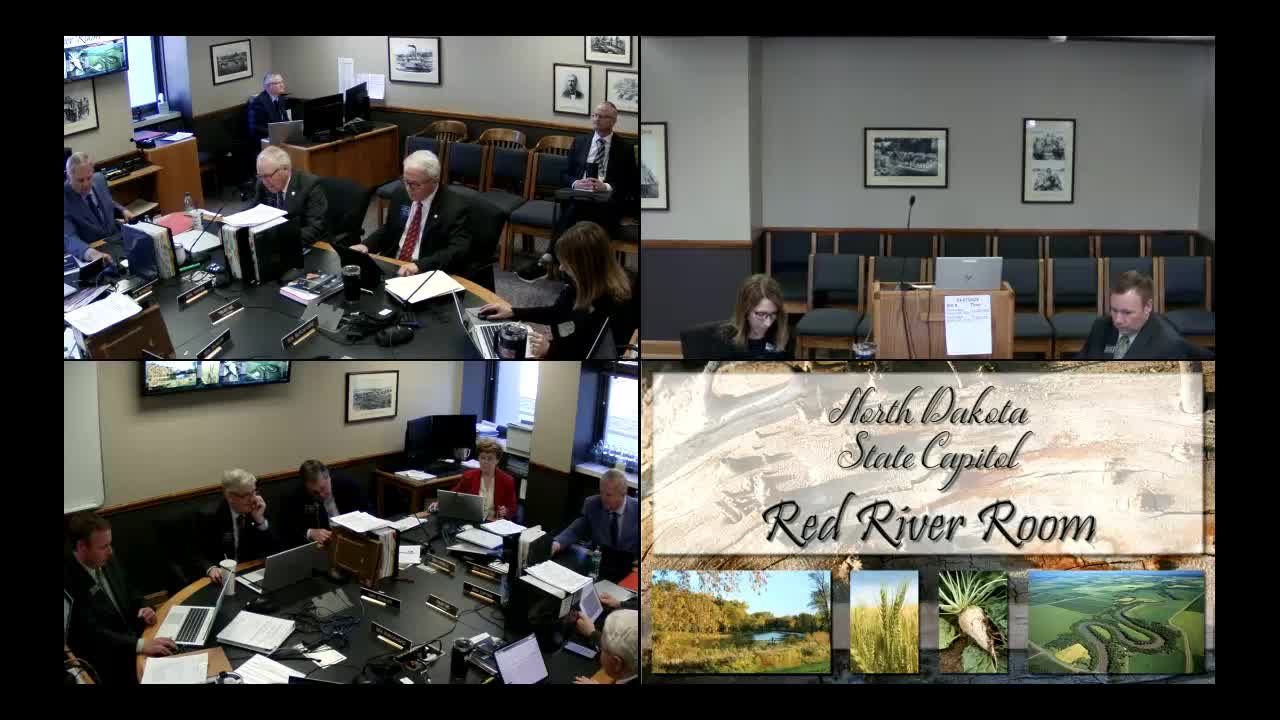Panel adopts amendments to House Bill 1330 to allow limited large in‑state investments, votes to remove mandatory divestment language from China provision
Get AI-powered insights, summaries, and transcripts
Subscribe
Summary
The Appropriations Government Operations Division approved amendments to House Bill 1330 that add a carve‑out allowing larger-than-$25 million in‑state investments if approved by advisory boards, adopted an amendment package, removed a section that would have mandated direct divestment from specified Chinese holdings, then voted to hold the bill.
The Appropriations - Government Operations Division on Monday adopted amendments to House Bill 1330 that add a statutory exception allowing the Legacy and Budget Stabilization Fund Advisory Board and the State Investment Board to approve concentrated in‑state investments that would exceed a $25,000,000 per‑holding diversification threshold.
The amendment package — described to the committee by Jody Smith, interim executive director for the Retirement and Investment Office — also keeps other return and benchmarking requirements for in‑state investments. The committee later voted to remove lines that would have mandated direct divestment from certain Chinese company holdings and ultimately decided to hold the bill for further discussions with leadership.
The changes matter because they alter how the state’s legacy fund can deploy private equity and infrastructure dollars inside North Dakota. The amendment inserts a new subsection that mirrors existing return expectations and adds a clause allowing concentrated investments “unless the Legacy and Budget Stabilization Fund Advisory Board approves the strategy allowing concentrated investments for in‑state infrastructure,” according to Smith.
Smith told the committee the practical implication is limited to dollars remaining in the private equity allocation: "We have 600,000,000 under that bucket, and we're not even saying that 200,000,000 would be used for other investments. We could come back in and say, hey. Nothing came up in the next year or 2 years." She described existing commitments of roughly $400,000,000 and said the authority would allow the office to consider individual investments larger than $25,000,000 if multiple layers of review recommend the investment.
Smith also summarized the statutory placement and benchmarks: the amendment duplicates the a/b benchmark language already in 21‑10‑11 for other private equity allocations and adds the new subsection c to permit a concentration exception with board approval. She said the office would run proposed projects through a third‑party fund manager and the Legacy Fund Advisory Board and State Investment Board before committing. "They would give that report back to the Legacy Fund advisory board and either recommend the investment or not recommend the investment," she said.
Committee members pressed for detail on scale and risk. Smith said the vetting process would tend to be lengthy — typically 12 to 18 months for a large project — and that the advisory board and State Investment Board would vote on any exception. She noted the office currently holds roughly $12,000,000,000 in total assets, with about $22,000,000 in direct investments in Chinese companies and roughly $640,000,000 in Chinese commingled funds; she said divesting commingled funds would be costly and that the bill as written would require only divestment of direct holdings.
Senators debating the bill expressed differing views about the practicality and scope of state‑level divestment from China. Some members questioned whether state action on a small direct holding would make a material difference for a globally integrated fund. Others favored preserving an option for the boards to act without mandating immediate divestment.
Votes at a glance
- Motion to adopt amendment packet (referred to in committee as "amendment 2002"): moved by Senator Dwyer, seconded by Senator Sickler; roll call in the transcript recorded the following ayes: Senator Sickler (Aye), Senator Urboli (Aye), Senator Dwyer (Aye), Senator Burkhart (Aye), Senator Wozniak (Aye). The chair declared the bill in front of the committee "as amended." (Recorded outcome: approved by committee on the amendment.)
- Motion to remove lines 12–20 of section 1 (which would have included mandatory direct‑holding divestment language): moved by Senator Dwyer, seconded by Senator Herbley; roll call in the transcript recorded at least these votes: Senator Sigler (Aye), Senator Erbling (Aye), Senator Dwyer (Aye), Senator Burkhart (Aye), Senator Wozniak (No). The motion passed on the roll call recorded in the transcript.
After the amendment votes, committee discussion led to a decision to hold the bill for additional leadership consultation. Senator Herbley asked that leadership be consulted and the chair agreed to hold the bill and to circulate a drafted amendment by Brady for committee review.
The committee’s actions do not by themselves change statute; adopted amendments will appear in the bill text only after the bill advances through the full floor process.
The transcript shows committee members repeatedly distinguishing between discussion, advisory review and formal action: the new subsection authorizes a board‑approved exception to the $25,000,000 diversification threshold but does not itself commit funds or identify any specific project. Committee members also noted the Office of Foreign Assets Control and federal sanction lists remain a separate compliance/monitoring function that the Retirement and Investment Office and its fund managers already consider.
What’s next
Committee members asked staff to draft the approved amendment language and circulate it; the chair said the panel would “sleep on it” and consult leadership before taking further action. The bill remained held at the end of the session recorded in the transcript.
(Reporting note: quotations in this article are verbatim from the committee transcript.)
